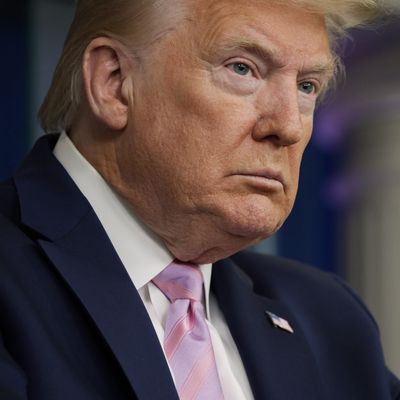
Last Friday, President Trump used his daily press conference to proclaim that he would soon tell the country when he planned to open it back up. “I’m going to have to make a decision …” he said, portentously. “I would say, without question, it’s the biggest decision I’ve ever had to make.”
Trump does not in fact have the legal authority to make this decision. Stay-at-home orders have been made by governors and mayors, not by the president. Apparently angered by news coverage pointing out his legal impotence, Trump announced on Twitter that he does too have the power:
As a matter of law, Trump is wrong. State and local officials have legal authority to close businesses and public buildings in order to safeguard public health. As University of Texas law professor Bobby Chesney has pointed out, “No currently existing statute plausibly can be read to confer such an authority on the president.”
Indeed, the shoddiness of Trump’s legal reasoning is apparent in his tweet itself. Trump begins by claiming that authority to control closures rests with the “President of the United States & the Federal Government,” but then in the very next sentence asserts that the power rests solely with “the President.” The federal government in fact has multiple branches. Congress is a coequal branch of government. If Congress passed a law giving the president legal authority to override stay-at-home orders, there might be at least a legal battle. But Congress hasn’t passed anything like this. So, while Trump is simply declaring himself to be the federal government, that is not how the Constitution works.
Why would Trump be disputing the law? The stupidest, and therefore most likely, explanation is that Trump is simply angry that cable news is discussing the fact that Trump’s “decision” is not actually his to make. Trump likes positioning himself as the protagonist of the Trump Show, and it will not do for the narrator to explain that the big reveal in tomorrow’s episode has been determined by some off-screen characters. (The exception, of course, is when Trump has screwed something up, in which case he foists all responsibility onto his subordinates and berates them for their failure.)
But it is also possible that Trump is actually planning a showdown of some kind with state and local officials. He is reportedly leaning toward announcing a May 1 date for a grand reopening of the country, reflecting his desire for a splashy celebratory announcement. Trump may not want his big day to be stepped on by troublesome local officials diminishing his powers.
Trump genuinely does not grasp the distinction between his relationship to the federal government and his relationship to the Trump Organization. He believes he is entitled to the same measure of full control over both, with the complete personal loyalty of every employee thereof. “I have an Article 2,” as he has once put it, “where I have the right to do whatever I want as president.”
At his press conference, Trump repeatedly asserted that he has absolute authority. “When somebody’s president of the United States, the authority is total, and that’s the way it’s gotta be,” he asserted, dismissing out of hand the clear legal authority possessed by state governments. When a reporter asked if any governors had agreed with Trump that he has this right, he replied, “I haven’t asked anybody, because – you know why? – because I don’t have to.” When she asked if any governors agreed, he shushed the question:
Trump may have in mind a legal fight. More plausibly, he may have in mind a political fight in which he would brandish his messaging platform and control over federal purse strings to force governors to follow his schedule. Trump has long believed that Democrats and the media hyped up the coronavirus to spook the markets and cause a panic that would tank the economy in order to harm his reelection prospects. In Trump’s mind, stay-at-home orders are part of the anti-Trump plot.
Trump’s response to the coronavirus has alternated between denial, blame-shifting, and ineffectual bluster. It was inevitable that he would come around to claiming extra-constitutional authority. It will probably amount to just more bluster. But when a president with a pronounced contempt for the rule of law announces more legal principles he refuses to respect, it is worth paying attention.
This post has been updated.






























